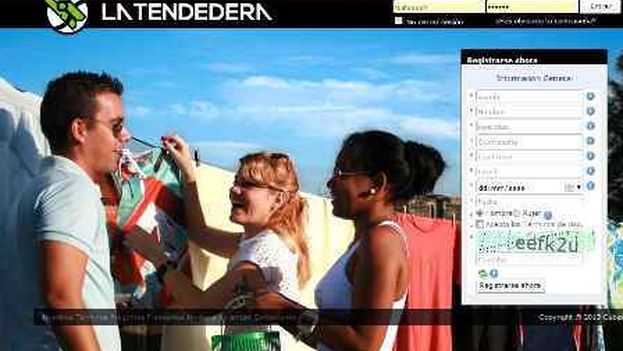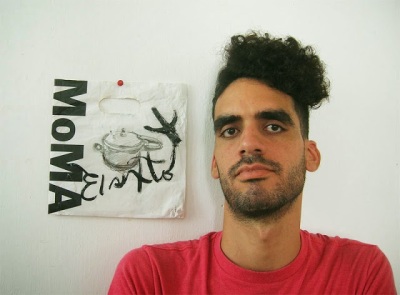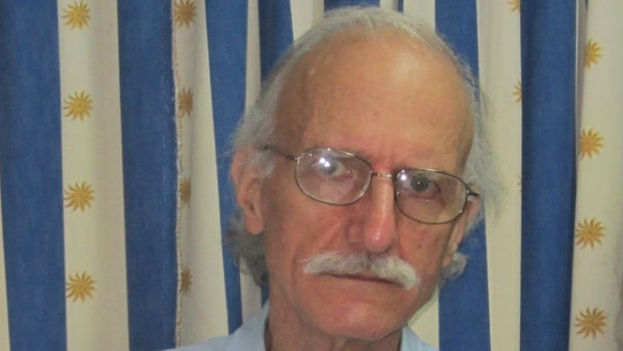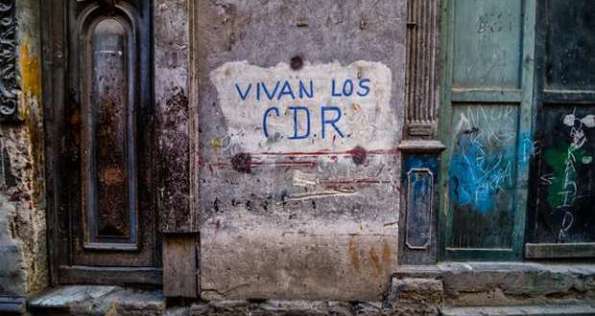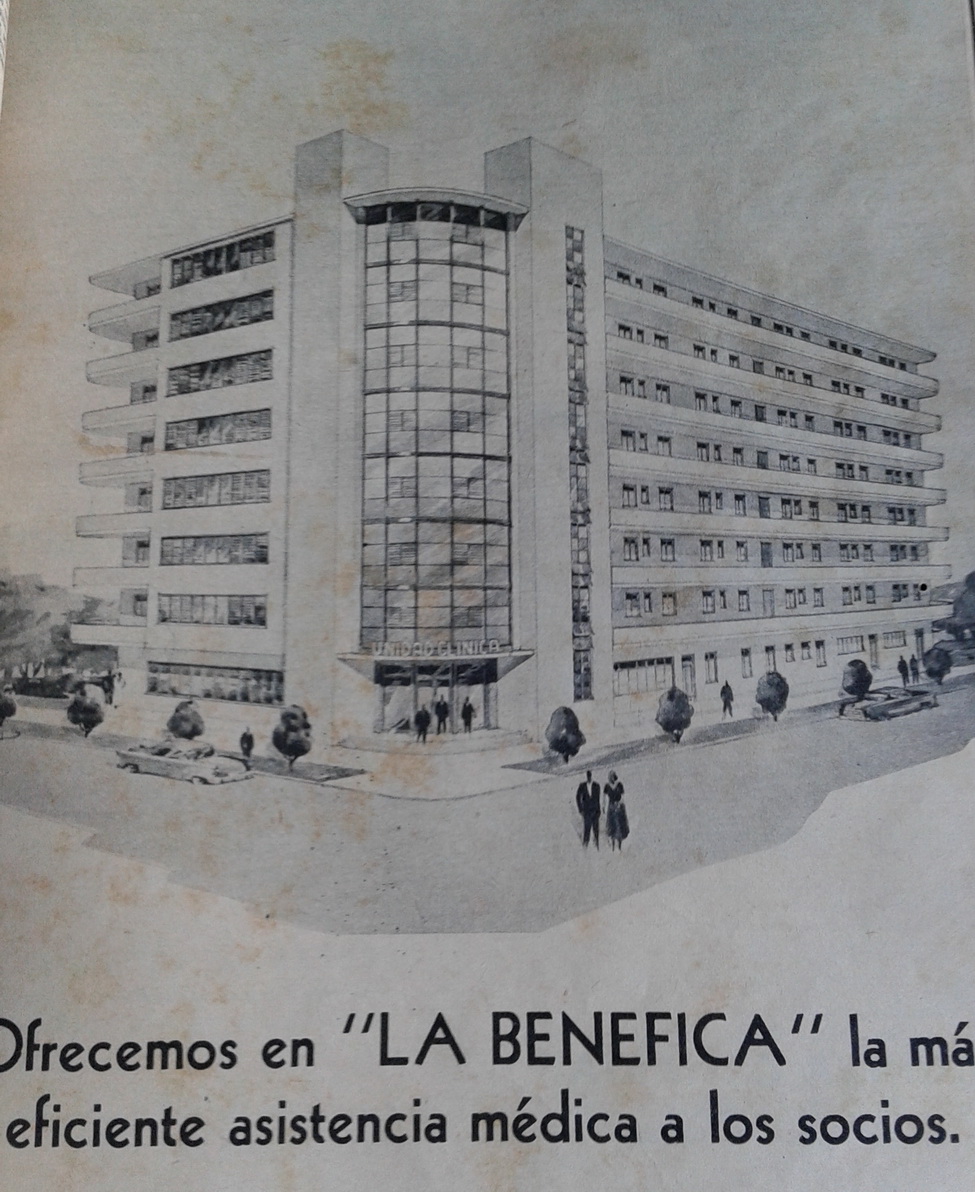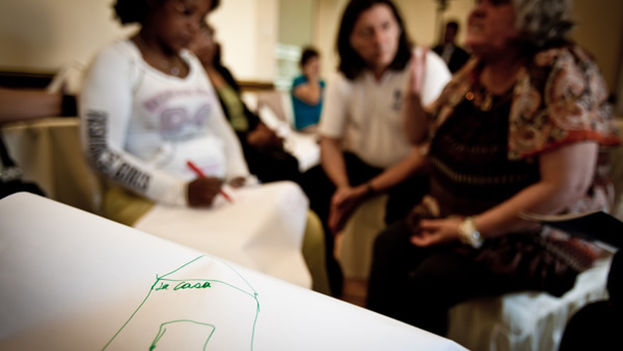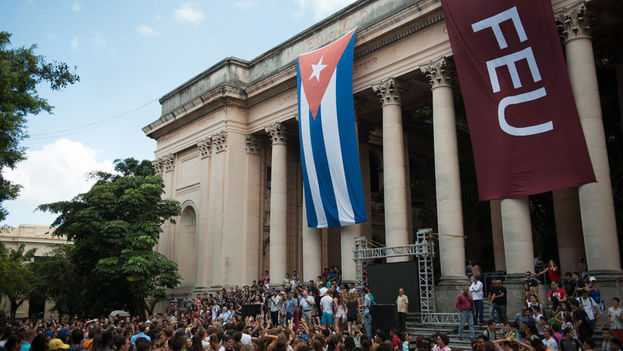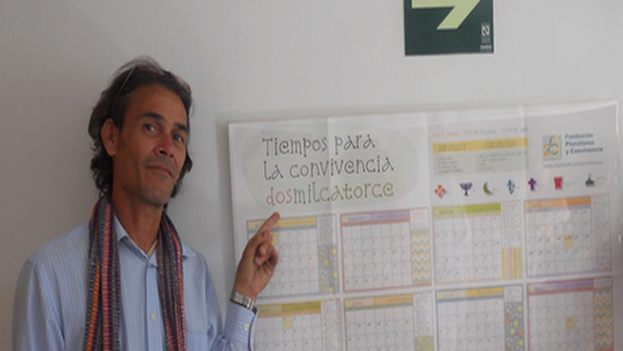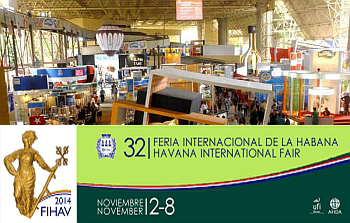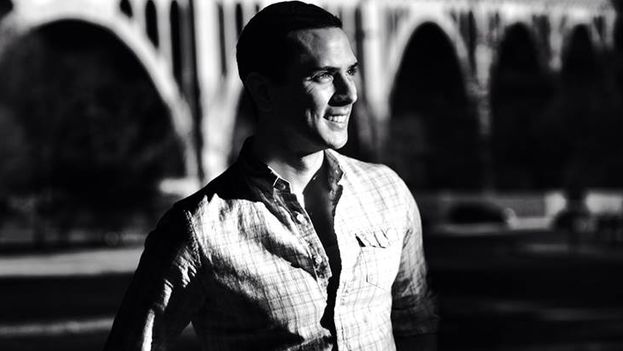
Our team had a conversation with the New York Times journalist who has authored the editorials about Cuba.
14ymedio, 1 December 2014 — Ernesto Londoño, who authored six editorials on Cuba published recently by the New York Times engaged in a friendly conversation on Saturday with a part of the 14ymedio team, in the hotel where he is staying in Havana.
Our intention was to interview him, but he told us the rules of his media prohibit his giving interviews without previous consultation. He also declined our proposal to take photos. Instead, he was eager to listen to our opinions in an atmosphere of mutual respect. There were two hours of conversation dedicated to refining, enriching and debating the controversial ideas that the newspaper has addresses in his editorials.
The following is a brief synthesis of what was said there, arranged by topics and ascribed to the author of each opinion.
Journalism
Yoani Sánchez: Cubans are going to need a great deal of information to avoid falling into the hands of another authoritarianism. In 14ymedio we are including a plurality of voices, for example on the issue of the embargo. We leave it to the reader to form his own opinion from a variety of information.
Reinaldo Escobar: The official Cuban press, which is all the press, there are no public media, they are private property of the Communist Party. Now, has there been a change? Yes, there has been a change. Since a few years ago the newspaper Granma has had a weekly section with letters by readers where you find criticism of bureaucrats, things that don’t work or prices at the markets. But look, the emphasis is on the self-employed markets.
So far I have not read a profound criticism of the prices at the convertible peso markets that the Government has, which are abusive. Nor can you talk about the legitimacy of our rulers or the impracticality of the system. Here are two big taboos, and in the third place, the topic of political repression. If they report on a repudiation rally, they show it as something spontaneous on the part of the people, without telling how the political police were behind it, organizing it all.
Miriam Celaya: There are changes indeed. The problem is that there are real and nominal changes, and these changes are generally nominal. Now everyone in Cuba can legally stay in a hotel, which before was forbidden. They never explained why it was forbidden before. But Cubans cannot really afford the luxury of a hotel stay, with wages being what they are; nor can they buy a car, a house, or travel. The problem with the reforms is that they are unrealistic for the vast majority of Cubans. They are a government investment in order to buy time.
There are two of those reforms that are particularly harmful and discriminatory for Cubans. One is the foreign investment law, which is explicitly for foreign investors and it does not allow Cubans to invest; and the other is a new Labor Code which does not acknowledge autonomy, the right to strike, and which spells out explicitly that Cuban workers cannot freely enter into contracts with potential companies investing in Cuba, which constitutes a restraint and a brake.
Víctor Ariel González: Yes, things are changing, but we ask ourselves if really those changes offer a brighter horizon and why people keep leaving, even more are going than before.
More Apathetic Youth?
Miriam Celaya: It is a backlash against ideological saturation, a submissiveness which conditioned almost every act of your life to obedience, to political subordination, whether picking a university career, a job or an appliance, anything. Everything was a slogan, everything a roadblock. This has subsided somewhat, but previously, it was impossible to take a step without hearing “Motherland or death, we will triumph” and go, go… The investigations they undertook to see if you belonged to the Committee for the Defense of the Revolution… the youth of today have not experienced that bombardment of “the enemy that harasses us.” I did not bring up my kids in that, on the contrary, I tried to detoxify them. So this generation, the children of the parents of disenchantment, grew up devoid of that and are at a more pragmatic level, even at a marketing one, whose greatest dream is to leave the country.
Economy
Eliécer Ávila: The law governing the leasing (in usufruct) of lands for farmers to work them was the basis of a plan for increasing food production and lowering prices — so that the average salary for a day’s work might be more than just three plantains.
I come from the banana plantations of El Yarey de Vázquez, in Puerto Padre, Las Tunas. The nation’s food supply is the most critical element in our collective anger. In January of last year, a pound of onions cost 8 Cuban pesos (CUPs). Later, between March and April, the price rose to 15. In May it increased to 25 CUPs and now, the onion has disappeared from low-income neighborhoods. It can only be found in certain districts such as Miramar, at five convertible pesos (CUCs) for 10 onions — more expensive than in Paris — while the monthly Cuban salary still averages under 20 CUCs per month).
I know very few farmers who even own a bicycle. However, any young person who joins up with the Ministry of State Security is in no time riding around on a Suzuki motorcycle.
Embargo
Yoani Sánchez: When talking about the end of the embargo, there is talk of a step that the White House must take, and for me I don’t care for the idea that what happens in my country depends on what happens in the White House. It hurts my Cuban pride, to say that the plans for my future, for my childrens’ future, and for the publication of 14ymedio depend on what Obama does. I am concentrating on what is going to happen in the Plaza of the Revolution and what civil society here is going to do. So for me I don’t want to bet on the end of the embargo as the solution. I want to see when we will have freedom of expression, freedom of association and when they will remove the straitjacket from economic freedom in this country.
Miriam Celaya: The reasons for the establishment of the embargo are still in effect, which were the nationalizing of American companies in Cuba without proper compensation. That this policy, in the limelight for such a long time, has subsequently become a tug of war is another thing. But those of us with gray hair can remember that in the 70’s and 80’s we were under the Soviet protectorate. Because we talk a lot about sovereignty, but Cuba has never been sovereign. Back then, Soviet subsidies were huge and we hardly talked about the embargo. It was rarely mentioned, maybe on an anniversary. Fidel Castro used to publicly mock the embargo in all forums.
Reinaldo Escobar: They promised me that we were going to have a bright future in spite of the blockade and that was due among other things to the fact that the nation had recovered their riches, confiscating them from the Americans. So what was going to bring that future was what delayed it.
Miriam Celaya: The issue remains a wildcard for the Cuban government, which, if it has such tantrums about it, it’s because it desperately needs for it to be lifted, especially with regards to the issue of foreign investments. I am anti-embargo in principle, but I can see that ending it unilaterally and unconditionally carries with it greater risks than the benefits it will supposedly provide.
Victor Ariel Gonzalez: The official justification says that as we are a blockaded country so we have the Gag Law. Because we are under siege and “in the besieged square, dissidence is treason.” There are those who believe that if the embargo is lifted that justification would end. But you have to say that this system has been very effective in finishing off the mechanisms for publicly analyzing the embargo, it has killed off independent institutions.
Then, how will people be able to channel discontent and non-conformity with the continued repression the day after the lifting of the embargo?
Reinaldo Escobar: They will have another argument for keeping repression when the embargo is lifted. Write it down, because “this will be the test” as they say around here: “Now that the Americans have the chance to enter Cuba with greater freedom, now that they can buy businesses and the embargo is over, now we do have to take care of the Revolution.” That will be the argument.
Repression
Yoani Sánchez: In this country people are very afraid. Including not knowing they’re afraid, because they have lived with it for so long they don’t know that this is called “fear.” Fear of betrayal, of being informed on, of not being able to leave the country, of being denied a promotion to a better job, not being able to board a plane, that a child won’t be allowed to go to the university, because “the university is for Revolutionaries.” The fears are so many and so vast that Cubans today have fear in their DNA.
Eliécer Ávila: We also need to understand how Cubans make their living. Ninety percent of Cubans do not work where their calling or vocation would take them, but rather where they can survive and make do. In this country, to be a Ph.D. in the social sciences is truly to be the idiot of the family. This is the same guy who can’t throw a quinceañera party for his daughter, who can’t take his family out to dinner at a restaurant. The successful person in this society is the manager of a State-owned cafeteria. This is because he controls the supplies of chicken, oil, rice, etc. and sells the surplus on the black market — which is really how he makes his living. The fundamental tactic to create social immobility in this country is [for the State] to make as many people as possible feel guilty about something.
Self-employment
Eliécer Ávila: People think that because there is now self-employment in this country, that there is a way to be more independent of the State — which is true up to a point. But the question is, how does a self-employed business person survive? I had to leave my ice cream business. After having received my degree in information technology, I was sent to the interior as a sort of punishment for having an incident with Ricardo Alarcón, who at that time was the President of the National Assembly. It was a turning point for me as I tried to become one of the first self-employed people in my town. I had a 1967 German ice cream maker. The process requires 11 products — including coagulant, which someone had to steal from the ice cream factory. Or rather, I should say, “recover,” because in this country we do not call that kind of thing “stealing.” The milk had to be taken from the daycare center, or from the hospital, so that it could be sold to me. The point is, there simply is no other way.
All of these private businesses that are springing up and flourishing are sustained by illegality.
Yoani Sánchez: … Or in the capital that comes clandestinely from abroad, especially from the exile. There are restaurants in Havana that could be in New York or Berlin, but those have received foreign money or are engaging in “money laundering” from the corruption and from the highest leadership itself.
Eliécer Ávila: Many of these businesses are created so that government officials can place their children, grandchildren and friends in them, people who are no longer interested in the creation of the “New Man” nor in achieving a communist society. Rather, they want to launder their money and insert themselves in society like any other person.
I do not know a single communist worker in Cuba who has been able to launch a business. Those committed Revolutionaries, who gave their all, are today the people who don’t have onions in their kitchens.
Yoani Sánchez: Self-employment has been presented as one of the major indicators of the “reforms” or the Raul regime changes. But on the issue of self-employment many things are not considered: they have no access to a wholesale market, they can’t import raw material nor directly export their products. Thus, the annoyance all Cubans have with the customs restrictions that went into effect in September. The Government justifies is saying that “every country has this kind of legislation,” but in those countries there are laws for commercial imports.
Miriam Celaya: They made a special regulation for foreign investors, so they can import, but not for Cubans.
Yoani Sanchez: Another issue that greatly affects the economy is the lack of Internet connection. We’re not just talking about freedom of expression and information or being able to read 14ymedio within Cuba, but that our economy is set back more and more by people not having access to the Internet.
Luzbely Escobar: It’s not only that: Self-employment is authorized only for selling or producing, but the professionals cannot join that sector with their abilities. You cannot be a self-employed lawyer, architect or journalist.
Miriam Celaya: A large administrative body was created to control the self-employed and it is full of corrupt individuals, who are always hovering over these workers to exploit them and relieve them of their gains. Some tell me that there are fixed fees for inspector bribes. Here, even corruption is institutionalized and rated.
Eliécer Ávila: In this country, for everyone who wants to lift his head towards progress, there are ten who want to behead him. There is much talk of “eliminating the middleman.” However, the great middleman is the State itself, which, for example, buys a pound of black beans from the farmer for 1.80 CUPs, then turns around and sells that pound for 12 CUPs at a minimum.
The New York Times Editorials
Eliécer Ávila: It would be a great favor to Cuba if, with the same influence that these editorials are intended to have on the global debate about one topic [the embargo], they also tried to shed light on other topics that are taboo here, but that go right to the heart of what we need as a nation.
Miriam Celaya: I have an idea. Rather than making gestures about the release of Alan Gross, rather than making gestures about making the embargo more flexible, I think that the strongest and clearest gesture that the Cuban government could make would be to liberate public opinion, liberate the circulation of ideas. Citizens should manifest themselves; this is something that is not happening here.
Reinaldo Escobar: Without freedom there is no citizen participation.
Miriam Celaya: What is going on with these editorials? They are still giving prominence to a distorted, biased view, composed of half-truths and lies about what the Cuban reality is. They are still giving prominence to what a government says, and Cuba is not a government. Cuba’s government today is a small group of old men, and when I say “old” it’s because of their way of thinking, of individuals who have remained anchored in discourse rooted in a cold war and belligerence. The Cuban people are not represented in that government.
Yoani Sánchez: I read editorials when they came out but last night went back to read them more calmly. The first editorial is perhaps the most fortunate, because it achieves a balance between one side and the other, but there are some that I think are really pitiful. Such as the one about the “brain drain” because these medical professionals are living a drama in this country that is not recognized in these texts.
First, I am against the concept of the theft of, or brain drain, because it accepts that your brain belongs to someone, to the nation, to the educational structure, or to whoever taught you. I think everyone should decide what to do with his or her own brain.
That editorial gives no space to the economic tragedy experienced by these professionals in Cuba. I know surgeons who may be among the best in their specialty in Latin America and they can’t cross their legs because people would be able to see the holes in their shoes, or they have to operate without breakfast because they can’t afford breakfast.
Miriam Celaya: There is something in that editorial that cuts and offends me, and it’s that slight of condescension, for instance, in this quote: “Havana could pay its workers more generously abroad if the medical brigades continue to represent an important source of income”… But, gentlemen! To do so is to accept the slavery of those doctors. It is to legitimize the implied right of a government to use its medical personnel as slaves for hire. How can that be?
Yoani Sánchez: With regards to these medical missions, I must say that the human character, no one can question it, when it comes to saving lives. But there has to be a political side and that is that these people are used as a kind of medical diplomacy, to gain followers, and because of this many countries vote at the United Nations on behalf of the Government of Cuba, which has practically hijacked many countries because they have Cuban doctors in their territories. It becomes an element of political patronage.
Another aspect is the economic, which is pushing doctors to leave because they can see the appeal of having a better salary, they can import appliances, pots for their home, a computer. Also, every month their bank account gets a deposit of convertible pesos, which they only get to keep if they return to Cuba and don’t desert from the mission. From a labor and ethical point of view it is very questionable.
Another issue is the negative impact it has on the Cuban healthcare system.
Luzbely Escobar: You go to a clinic and it is closed, or of the three doctors on duty, only one is there because the other two are in Venezuela, and then there is total chaos.
Miriam Celaya: In these editorials, I have read “Cuba” instead of “the Cuban government,” and I have read that the members of “the dissidence” were considered “charlatans.” These definitions, in addition to being disrespectful, put everyone in the same bag. Here, as everywhere else, society is complex, and, while it’s true that there are charlatans among the opposition – and among the government too — there are a lot of honest people who are working very faithfully for a better Cuba, with the greatest sacrifice and risk.
When they demonize it, then it seems that they are speaking the government’s language, as if they had written this in a room of the Party Central Committee and not in a newsroom of a country in the free world. Such epithets, coming from prestigious media, end up creating opinion. That’s a big responsibility.
Dissidence
Yoani Sánchez: In this country the nation has been confused with the government, the homeland with a party, and the country with a man. Then this man, this party and this government have taken the right to decide on behalf of everyone, whether it’s about growing a tomato or a cachucha pepper, or what ideological line the whole nation is going to follow.
As a consequence, those of us who have ideas different from those of that party, that government, and that man in power, are declared to be “stateless” or “anti-Cuban” and charged with wanting to align ourselves with a foreign power. It is as if now, that the Democratic party is governing the United States, all Republicans were declared to be anti-American. This is, like all the countries in the world, plural. If you walk down the street you are going to meet every kind of person: anarchist, liberal, social democrat, Christian democrat and even annexationist. Why can’t this so plural discourse be expressed in a legal way? And why do people like us have to be excluded from speaking and offering opinions?
Translated by Alicia Barraqué Ellison, MLK, MJ Porter and Norma Whiting

